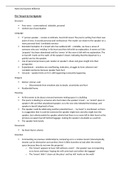Summary
Summary The Tenant by Na Ngulube/Ncube
- Course
- Institution
This is a comprehensive analysis of the poem The Tenant by Na Ngulube/Ncube. It includes an analysis of the poem's structure, language, imagery, movement, intentions, themes, tones, and sounds, as well as a line-by-line analysis, overall analysis, and thorough annotations. It is a summary of my cla...
[Show more]



